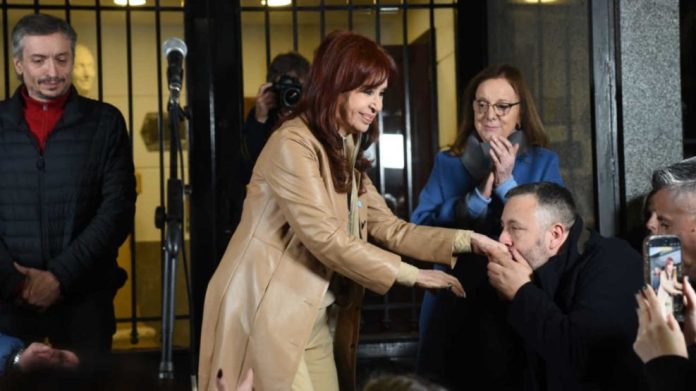Soldecanarias.net / International Desk
The image speaks volumes: Cristina Fernández de Kirchner, former president of Argentina and a central figure in Latin American politics for over two decades, is now serving house arrest with an electronic ankle monitor. Argentina’s Supreme Court has confirmed a six-year prison sentence for corruption, along with a lifetime ban from holding public office. It is the most dramatic chapter in the long political and judicial saga of the Peronist leader.
At 10 a.m., the federal judge in charge of the case ordered the sentence to be carried out under house arrest, citing age and health concerns. Kirchner, 72, remains at her home in the Recoleta neighborhood of Buenos Aires, surrounded by supporters who have plastered the area with banners denouncing what they call “political and judicial persecution.”
A Historic Verdict
The conviction stems from the so-called “Vialidad case,” in which Kirchner was found guilty of irregularly awarding public works contracts to favored companies during her presidency (2007–2015). The court ruled that a systematic corruption scheme was in place, with Kirchner at its center.
The Supreme Court’s unanimous confirmation marks a turning point in Argentina’s legal and political history. In a country where political impunity has often been the norm, the Kirchner case sets a precedent without recent parallel.
Regional Reverberations
The ruling’s impact goes far beyond Argentina’s borders. Alongside Hugo Chávez, Lula da Silva, and Evo Morales, Cristina Kirchner was one of the most visible faces of Latin America’s early 21st-century “pink tide.” Her fall represents not only the waning of that political cycle, but also the rise of judicial power capable of holding even the most powerful accountable.
At a time when other regional leaders—such as Nicolás Maduro in Venezuela or Nayib Bukele in El Salvador—face mounting scrutiny, the house arrest of a former Argentine president under a firm corruption conviction will draw global attention.
Polarized Reactions
Reactions both within and outside Argentina have been deeply polarized. Members of the ruling coalition have decried the verdict as “political lawfare,” accusing the judiciary of targeting left-wing leaders. The opposition, however, hailed it as “the end of Kirchnerist impunity.”
Human rights organizations like Human Rights Watch and Amnesty International have requested full access to the case details to assess whether due process standards were met. The European Union issued a cautious statement, expressing “confidence in Argentina’s democratic institutions” and calling the ruling “a domestic matter under the rule of law.”
What’s Next?
With Kirchner out of the electoral picture and confined to her home, the Peronist movement must urgently find new leadership. Figures such as Sergio Massa, former Economy Minister, are gaining ground as the party faces internal rifts between hardline Kirchnerists and more centrist factions.
Kirchner may still appeal to international bodies, such as the Inter-American Court of Human Rights, but such processes are lengthy and their outcomes uncertain.
A Symbolic End
Twice elected president, Cristina Fernández de Kirchner was a charismatic and polarizing figure who defined an era in Argentine and Latin American politics. Now, with an electronic monitor around her ankle and a definitive sentence to her name, her political career enters a twilight phase few would have predicted a decade ago.
In a region where powerful leaders have often eluded justice, the Kirchner case poses a difficult but necessary question: Is Latin America entering a new era of true accountability?



